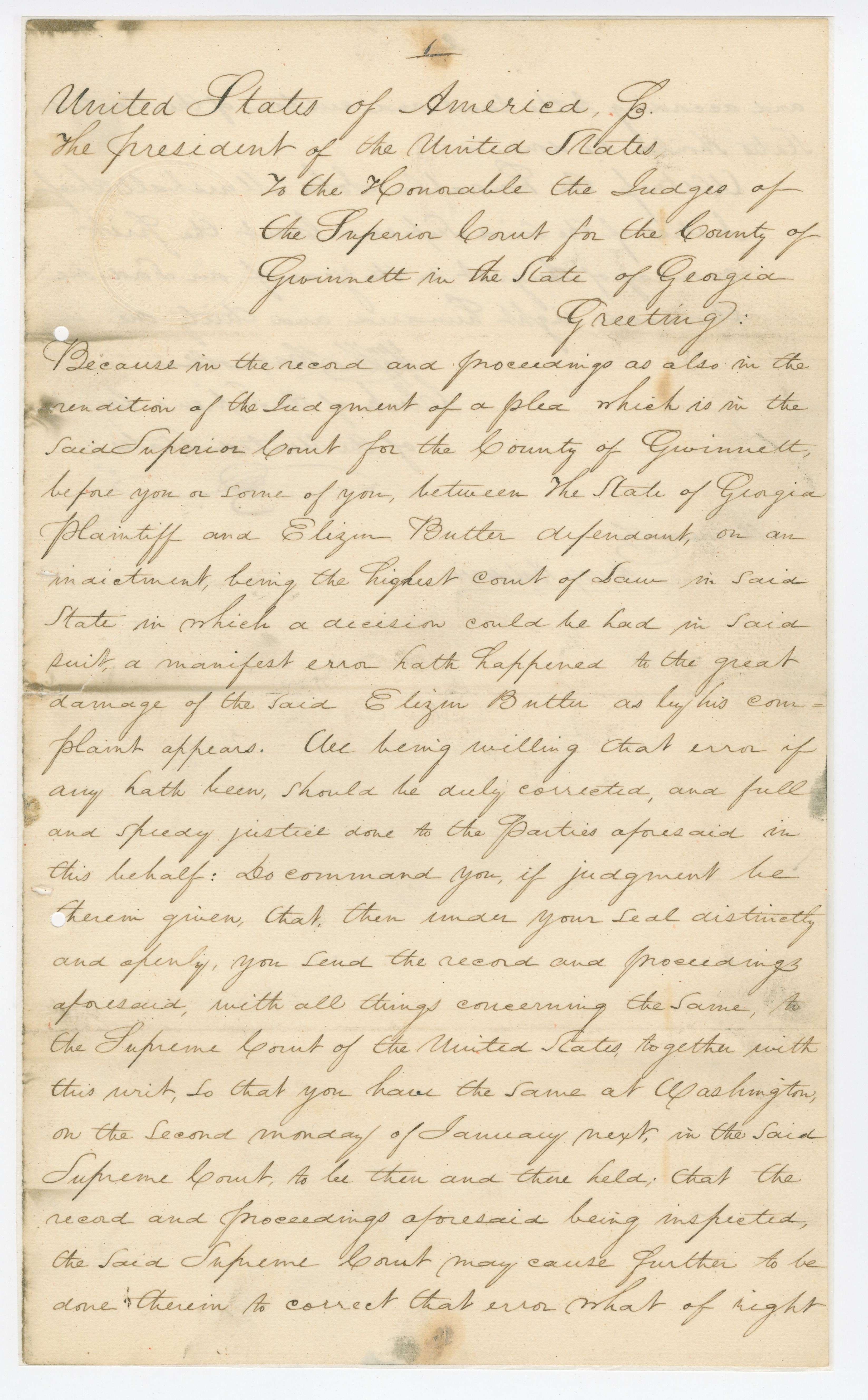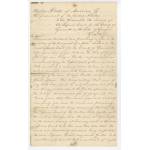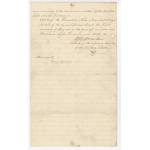Supreme Court Request to Deliver the Elizur Butler Case for Review
8/1/1831
Add to Favorites:
Add all page(s) of this document to activity:

Add only page 1 to activity:
Add only page 2 to activity:
The Supreme Court sent this document to the State of Georgia. It is included in the case file for Worcester v. Georgia. They asked Georgia to send all of the records in the Elizur Butler case to Washington for review by the U.S. Supreme Court.
Butler and Samuel Worcester had pleaded not guilty to the charge of failing to obtain a permit or license to reside on Cherokee land. In 1830, Georgia had passed a law requiring non-Cherokee to obtain a permit from the state of Georgia to do so. A group of missionaries, including Worcester and Butler, were indicted by a grand jury after they went to live on Cherokee land in Georgia, with permission from the Cherokee Nation and the U.S. Government. The Superior Court of Gwinnet in Georgia found them guilty, and sentenced them to four years of hard labor.
The men appealed. After they were unsuccessful in the highest state court, they appealed to the U.S. Supreme Court on a writ of error (which demands the lower court provide the full record to a higher court for review of errors) in Worcester v. Georgia. The Federal question raised (necessary to appeal to the U.S. Supreme Court) was whether the state of Georgia had jurisdiction, since the men were present in the territory under authority of the U.S. President doing missionary work, and with the permission of the Cherokee Nation. In other words, did the state of Georgia have the authority to hear the case or to pass laws concerning sovereign Indian nations?
The question had been asked of the Supreme Court before. In 1828, Georgia had passed a series of acts taking away rights of Cherokees residing within the state, including Cherokee removal from land that the state wanted. The Cherokee asserted that Georgia did not have the jurisdiction or authority to do these things, since the Cherokee Nation was sovereign and protected under a treaty with the United States. They sought an injunction — or order to stop what the State of Georgia was doing — from the U.S. Supreme Court in Cherokee Nation v. Georgia in 1831. The Supreme Court said they lacked jurisdiction to hear the case and it was dismissed, leaving the Cherokee at the mercy of the laws of the state of Georgia.
In Worcester v. Georgia in 1832, however, the Supreme Court ruled that states, like Georgia, could not diminish rights of tribes because the Cherokee Nation constituted a nation holding distinct sovereign powers as granted by Congress and the United States. This established the principle of "tribal sovereignty." The Court also issued a mandate to release Worcester and Butler.
Georgia ignored the ruling, however, and did not release the men. President Andrew Jackson did not intervene to enforce the Supreme Court ruling. (Georgia Governor Wilson Lumpkin pardoned Butler and Worcester in 1833.)
So the judicial branch handed down a ruling that should have freed Butler and Worcester and established more sovereignty for the tribes; but it didn't have that effect because the executive branch did not enforce it.
President Andrew Jackson had called for the relocation of eastern Native American tribes to land west of the Mississippi River, and Congress had passed the Indian Removal Act, in 1830. The Cherokee were forcibly removed from Georgia — a journey west that became known as the “Trail of Tears” because of the thousands of deaths along the way.
This document was digitized by teachers in our Primarily Teaching 2016 summer workshop in Washington, D.C.
The men appealed. After they were unsuccessful in the highest state court, they appealed to the U.S. Supreme Court on a writ of error (which demands the lower court provide the full record to a higher court for review of errors) in Worcester v. Georgia. The Federal question raised (necessary to appeal to the U.S. Supreme Court) was whether the state of Georgia had jurisdiction, since the men were present in the territory under authority of the U.S. President doing missionary work, and with the permission of the Cherokee Nation. In other words, did the state of Georgia have the authority to hear the case or to pass laws concerning sovereign Indian nations?
The question had been asked of the Supreme Court before. In 1828, Georgia had passed a series of acts taking away rights of Cherokees residing within the state, including Cherokee removal from land that the state wanted. The Cherokee asserted that Georgia did not have the jurisdiction or authority to do these things, since the Cherokee Nation was sovereign and protected under a treaty with the United States. They sought an injunction — or order to stop what the State of Georgia was doing — from the U.S. Supreme Court in Cherokee Nation v. Georgia in 1831. The Supreme Court said they lacked jurisdiction to hear the case and it was dismissed, leaving the Cherokee at the mercy of the laws of the state of Georgia.
In Worcester v. Georgia in 1832, however, the Supreme Court ruled that states, like Georgia, could not diminish rights of tribes because the Cherokee Nation constituted a nation holding distinct sovereign powers as granted by Congress and the United States. This established the principle of "tribal sovereignty." The Court also issued a mandate to release Worcester and Butler.
Georgia ignored the ruling, however, and did not release the men. President Andrew Jackson did not intervene to enforce the Supreme Court ruling. (Georgia Governor Wilson Lumpkin pardoned Butler and Worcester in 1833.)
So the judicial branch handed down a ruling that should have freed Butler and Worcester and established more sovereignty for the tribes; but it didn't have that effect because the executive branch did not enforce it.
President Andrew Jackson had called for the relocation of eastern Native American tribes to land west of the Mississippi River, and Congress had passed the Indian Removal Act, in 1830. The Cherokee were forcibly removed from Georgia — a journey west that became known as the “Trail of Tears” because of the thousands of deaths along the way.
This document was digitized by teachers in our Primarily Teaching 2016 summer workshop in Washington, D.C.
Transcript
1United States of America
The President of the United States
To the Honorable the Judges of the Superior Court for the County of Gwinnett in the State of Georgia
Greeting:
Because in the record and proceedings as also in the rendition of the Judgment of a plea which is in the said Superior Court for the County of Gwinnett, before you or some of you, between the State of Georgia plaintiff and Elizur Butler defendant, on an indictment, being the highest court of Law in said State in which a decision could be had in said state in which a decision could be had in said suit, a manifest error hath happened to the great damage of the said Elizur Butler as by his complaint appears. We being willing that error if any hath been, should be duly corrected, and full and speedy justice done to the Parties aforesaid in this behalf: Do command you, if judgment be therein given, that, then under your seal distinctly and openly, you send the record and proceedings aforesaid, with all things concerning the same, to the Supreme Court of the United States, together with this writ, so that you have the same at Washington, on the second Monday of January next, in the said Supreme Court, to be then and there held, that the record and proceedings aforesaid being inspected, the said Supreme Court may cause further to be done therein to correct that error what of right
2
and according to the laws and custom of the United States should be done.
Witness the honorable John Marshall Chief Justice of the said Supreme Court the first Monday of August in the year of our Lord one thousand eight hundred and thirty one.
Wm. Tho. Carroll
Clerk of the Supreme Court of the United States
Allowed by
Henry Baldwin
This primary source comes from the Records of the Supreme Court.
National Archives Identifier: 38995510
Full Citation: Supreme Court Request to Deliver the Elizur Butler Case for Review; 8/1/1831; Appellate Case File Number 1705; Case File for Worcester v. Georgia; Appellate Jurisdiction Case Files, 1792-2010; Records of the Supreme Court, Record Group 267; National Archives Building, Washington, DC. [Online Version, https://docsteach.org/documents/document/worcester-v-georgia-butler-request, April 25, 2024]Rights: Public Domain, Free of Known Copyright Restrictions. Learn more on our privacy and legal page.





